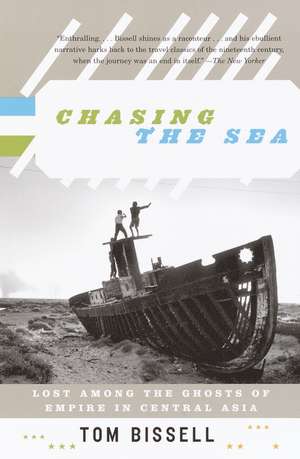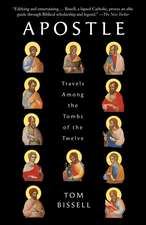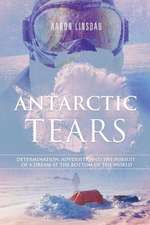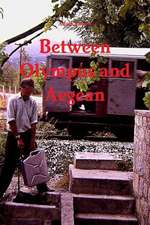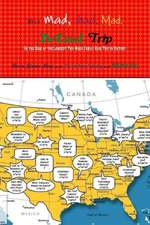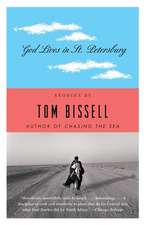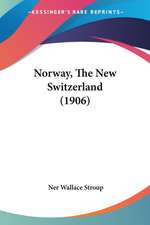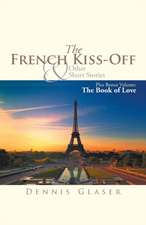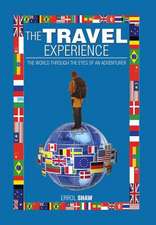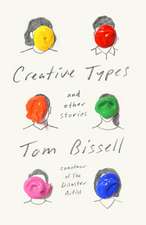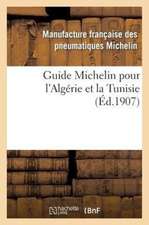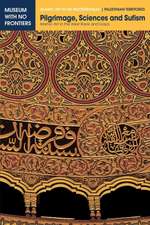Chasing the Sea: Lost Among the Ghosts of Empire in Central Asia: Vintage Departures
Autor Tom Bissellen Limba Engleză Paperback – 30 sep 2004
Vezi toate premiile Carte premiată
Saroyan Writing Prize (2005)
In Chasing the Sea, Bissell combines the story of his travels with a beguiling chronicle of Uzbekistan’s striking culture and long history of violent subjugation by despots from Jenghiz Khan to Joseph Stalin. Alternately amusing and sobering, this is a gripping portrait of a fascinating place, and the debut of a singularly gifted young writer.
Din seria Vintage Departures
-
 Preț: 108.09 lei
Preț: 108.09 lei -
 Preț: 108.91 lei
Preț: 108.91 lei -
 Preț: 109.73 lei
Preț: 109.73 lei -
 Preț: 90.64 lei
Preț: 90.64 lei -
 Preț: 103.53 lei
Preț: 103.53 lei -
 Preț: 99.60 lei
Preț: 99.60 lei -
 Preț: 109.95 lei
Preț: 109.95 lei -
 Preț: 107.46 lei
Preț: 107.46 lei -
 Preț: 104.58 lei
Preț: 104.58 lei -
 Preț: 121.63 lei
Preț: 121.63 lei -
 Preț: 95.10 lei
Preț: 95.10 lei -
 Preț: 117.69 lei
Preț: 117.69 lei -
 Preț: 107.05 lei
Preț: 107.05 lei -
 Preț: 138.12 lei
Preț: 138.12 lei -
 Preț: 91.27 lei
Preț: 91.27 lei -
 Preț: 136.59 lei
Preț: 136.59 lei -
 Preț: 108.50 lei
Preț: 108.50 lei -
 Preț: 128.33 lei
Preț: 128.33 lei -
 Preț: 104.58 lei
Preț: 104.58 lei -
 Preț: 109.54 lei
Preț: 109.54 lei -
 Preț: 108.50 lei
Preț: 108.50 lei -
 Preț: 107.46 lei
Preț: 107.46 lei -
 Preț: 94.10 lei
Preț: 94.10 lei -
 Preț: 109.95 lei
Preț: 109.95 lei -
 Preț: 75.68 lei
Preț: 75.68 lei -
 Preț: 100.23 lei
Preț: 100.23 lei -
 Preț: 105.54 lei
Preț: 105.54 lei -
 Preț: 106.76 lei
Preț: 106.76 lei -
 Preț: 91.13 lei
Preț: 91.13 lei -
 Preț: 119.23 lei
Preț: 119.23 lei -
 Preț: 90.72 lei
Preț: 90.72 lei -
 Preț: 111.71 lei
Preț: 111.71 lei -
 Preț: 92.01 lei
Preț: 92.01 lei -
 Preț: 105.29 lei
Preț: 105.29 lei -
 Preț: 132.88 lei
Preț: 132.88 lei -
 Preț: 88.68 lei
Preț: 88.68 lei -
 Preț: 118.51 lei
Preț: 118.51 lei -
 Preț: 114.79 lei
Preț: 114.79 lei -
 Preț: 118.51 lei
Preț: 118.51 lei -
 Preț: 110.28 lei
Preț: 110.28 lei -
 Preț: 114.79 lei
Preț: 114.79 lei -
 Preț: 99.82 lei
Preț: 99.82 lei -
 Preț: 104.34 lei
Preț: 104.34 lei -
 Preț: 99.41 lei
Preț: 99.41 lei -
 Preț: 90.91 lei
Preț: 90.91 lei -
 Preț: 121.28 lei
Preț: 121.28 lei -
 Preț: 88.66 lei
Preț: 88.66 lei -
 Preț: 125.54 lei
Preț: 125.54 lei -
 Preț: 114.38 lei
Preț: 114.38 lei -
 Preț: 101.17 lei
Preț: 101.17 lei
Preț: 125.54 lei
Nou
Puncte Express: 188
Preț estimativ în valută:
24.03€ • 26.11$ • 20.20£
24.03€ • 26.11$ • 20.20£
Carte disponibilă
Livrare economică 31 martie-14 aprilie
Preluare comenzi: 021 569.72.76
Specificații
ISBN-13: 9780375727542
ISBN-10: 037572754X
Pagini: 416
Ilustrații: 3 MAPS
Dimensiuni: 133 x 205 x 22 mm
Greutate: 0.31 kg
Editura: Vintage Publishing
Seria Vintage Departures
ISBN-10: 037572754X
Pagini: 416
Ilustrații: 3 MAPS
Dimensiuni: 133 x 205 x 22 mm
Greutate: 0.31 kg
Editura: Vintage Publishing
Seria Vintage Departures
Notă biografică
Tom Bissell was born in Escanaba, Michigan, in 1974. After his stint in the Peace Corps he worked for several years in book publishing in New York City. His criticism, fiction, and journalism have appeared in publications including Harper's Magazine, The Virginia Quarterly Review, GQ, Granta, McSweeney's, The Boston Review, The Believer, Best American Travel Writing 2003, and other publications. He has been nominated for several awards and not received any of them. He lives in New York City.
Extras
One
No English
April 2001
Anyone parted from his land will weep seven years. Whoever is parted from his tribe will weep until he dies.
--central asian proverb
April 2001
The night was hot or cold, depending on where one stood. In this it was not unlike swimming in the ocean and feeling across one's belly an amniotic warmth followed immediately by a freezing underwater gale. I paced around on the tarmac, examining the plane that had touched us down safely in Tashkent, the capital of Uzbekistan. The flight in was much fuller than I had expected, and my fellow passengers had disembarked. Most were, like me, standing on the tarmac and looking at the plane. It was dark, and there was not much else to look at. The plane was a fine gold-and-black Lufthansa jumbo jet. Lufthansa was the least dicey airline to fly into Tashkent, though Uzbekistan Airways, the national airline, was also quite good--internationally. Uzbekistan Airways's international flights employed Boeing and British-made jets easily as splendid as Lufthansa's. Uzbekistan was the only former Soviet republic other than Russia to have ever been allowed regular direct flights into the United States, something of which it was deservedly proud. On internal flights, however, Uzbekistan Airways sealed its passengers inside shaky old Russian-made Aeroflot propjets. One rumor I hoped to confirm on this trip was that, before takeoff on these internal flights, Uzbekistan Airways stewardesses poured everyone a heaping shot of vodka, including the captain. Including themselves.
Everything smelled hotly of fuel. It was as though we were downwind from a grounded F-15 with its engine at full burn. I remembered this smell. The last time I had smelled Tashkent was as a freshly arrived Peace Corps volunteer with hopes of teaching the natives English. I was not much of a traveler at the time. I used words like "natives." This was five years previous.
We had arrived in Tashkent at night. In 1996, only five years after Uzbekistan declared its independence from the Soviet Union, Tashkent's airport seemed ominously dark. When we landed and rolled toward the terminal, I saw that some of the runway lights were flickering. A few were burned out completely. Three-wheeled trucks of strange vehicular provenance sat abandoned along the runway. I remember that some of them were on fire, but this could be an enhanced memory. We deplaned and waited in clubbed silence on the tarmac. After a while a rickety metal tram arrived to haul us to the terminal. Inside the tram it was cattle-car dark and cold. It was a terrible joke--not mildly funny or even distracting--when, as the tram lurched toward the terminal, I began humming the theme to Schindler's List.
Now I waited for that same tram, upon that same tarmac, at that same airport. I looked around at my fellow passengers. Every pair of eyes shone with the glassy overlay of the seven-hour flight from Frankfurt. Every face was thick with sleeplessness. Many blue-jeaned and sweatshirted Germans idled around. I leaned over and asked a British man with whom I had chatted a bit on the plane, "What's with the Germans?" and rolling his eyes he answered, "Tour groups." Three tour groups, in fact. It seemed that, for reasons unknown, Germans love Central Asia. I later learned that they are, per capita, its most frequent tourists. Lingering on the crowd's edges were several slumped Uzbek or Turkish businessmen. They seemed tired, dignified, and quietly unhappy. I looked around. No one, with the exception of the Germans, appeared very happy, not even the young Russian-speaking Uzbeks in jean jackets and stylish black shoes carrying bags of duty-free booze and cigarettes. They looked over at me with lavish pouts and fading sullen eyes, still fried from having spent their weekend discothequeing in some glamorous international capital. Not typical citizens of Uzbekistan, needless to say. I wondered if they were government ministers' kids, seedlings of the vlasti (the unopposable few who controlled Soviet politics, culture, and society, and who in most of the former Soviet republics survived wholly intact), or the spawn of the Uzbek mafiya. Before I left on this trip, an Uzbek friend now living in Kentucky had sprung upon me the following koan: The economy in Uzbekistan was much, much worse today than in 1996, he said, but people were living better. I spent several nights attempting to comb the logic snarls from that sentence. Now, looking at nineteen-year-olds loaded up with importny loot, I had an idea of what he meant.
Those who were living better today were living better than anyone here had ever lived, better even than the Soviet bosses who in the 1970s had cruised around Tashkent in black Volgas with gray-curtained windows hiding the whores in the back seat. But ten years of corrupt, hybridized capitalismoid development was slowly teaching Uzbekistan's people that such lifestyles did not exist for those who had no "in," no clan, no muscle. No matter what average citizens of Uzbekistan did, no matter how good or honest or hardworking they were, the prestige-goods economy would remain beyond reach.
Two trams pulled up, their red running lights blinking. The tram I labored aboard was no cold, dark cattle car but a brightly lit Cobus 3000 with comfortable cushioned seats. It pleased me to see that Tashkent's airport seemed less eschatological than I remembered. Some of the buildings near the main terminal still looked slightly shelled, but several new buildings were going up.
The Germans had annexed Tram One, and Tram Two seemed drab in its silence. Some Russian was spoken, quietly, behind me. I turned. A young Uzbek mother in a leather jacket crouched and played peekaboo with her daughter. Her husband, a straphanging Uzbek wearing a gold watch, looked down at them and smiled with weary contentment. A cell phone blipped Mozart. Several people reached into their pockets, but only one withdrew. He was large, thick-necked, shaven-headed, Slavic. He glanced at the number on the phone's LCD, frowned, and put the phone back into his pocket. It rang a few more times and stopped.
Next to me was a young man wearing blue jeans and a flea-market dress shirt the color and texture of a tennis ball. His birdish thinness ceded a strange prominence to his otherwise normal-sized Adam's apple. The piping of his wraparound insectoid sunglasses was a bright iguana green. His chopped hair was purposefully messy. Everything about him suggested: American. He was enjoying a pose of which traveling Americans seem fond. This pose broadcast, roughly, I am an American, and you are an American, and we are both in a strange place. Despite that, I am not going to speak to you or make myself available in any way. I wondered if he was a Peace Corps volunteer fresh from a reefer-fueled jaunt across Thailand. Maybe he was an employ of one of the hipper agencies like Human Rights Watch. Maybe he was the "cool" Christian in some evangelical platoon spreading the Word to Central Asians. But he was returning to what he regarded as home--that much was obvious. He had the careless look of someone comfortable enough in a foreign environment not to worry anymore about looking like he belonged.
"Hey," I said.
He looked over at me. I could see nothing behind his tinted lenses. His mouth did not move.
"Do you live in Tashkent?"
He shook his head. His Adam's apple bobbed, then sank, its transit appearing somehow painful.
"Do you work here?"
"No English," he said suddenly.
"I'm sorry?"
He unplugged from himself a small flesh-colored earpiece. For the first time I heard the tinny sound of synthesized R&B. "No English," he said again. That everything about this young man suggested American should have been the first thing to tell me he was not an American.
"Oh," I told him. "Sorry."
He replugged his earpiece. "No problem."
A few moments later the tram stopped with an angry hydraulic hiss. The doors levered open. We filed into a long gray hallway that fed into the terminal. Tram One had beaten us here and already the end of the tunnel was clogged with humanity. Customs. Uzbekistan had for a time been one of the most difficult former Soviet republics to get into. This was not xenophobia. Rather, it reflected a long, complicated ignorance of how the mechanics of international travel were handled. Stalin had from the early 1930s until his death in 1953 sealed off Central Asia not only to other nations but to the Soviet people themselves. The legendarily stalwart adventurer Gustav Krist said in the 1930s that he "would sooner pay a call on the Devil and his mother-in-law in Hell" than travel through Central Asia without the proper papers. Travel here during that time often resulted in tragedy. Post-Stalin, there were two types of visitors to Uzbekistan: young banana-republic Communists from the Afro, Arab, and Asian worlds of Successful Socialist Modernization, who were flown to Tashkent, the New Showcase City of Modern Communism, in order to witness What the Future Held; and those few tourists who decided to endure a journey in this isolated, wildly unpredictable part of the world. The latter were almost always a part of the Soviet travel agency Intourist's forced marches through what the authorities allowed to be recognized as Uzbekistan's cultural highlights (very little Islam, much anonymous peasant striving, and only the most architecturally unignorable mosques). Uzbekistan, prior to its independence, had rarely seen its consciousness touched by the notion of individual, unauthorized travel. Even Uzbektourism, the infinitely more relaxed successor to Intourist, had for a time in the early 1990s demanded that all visitors present an invitation from an Uzbek host and documented proof of one's HIV-negative status. But things had changed. Provided you were a citizen of the United States, entry into Uzbekistan now required nothing more than an easily obtainable visa.
After thirty minutes my turn came. My passport was kept in a black pouch I wore on a rope around my neck. I did this so no one would suspect that I had other, more important documents stashed upon my person, which, point of fact, I did. I approached the glass cube in which a young blond Russian customs official sat pianoing his fingers. I pushed my passport through the slot. The Russian retrieved it and cracked it open. He consulted the screen of his very, very old computer, then looked at me with coldly official eyes. That Russians have cold eyes is a cliche, but it is true. To gaze into this blond Russian's eyes was like being stabbed with an icicle. He was wearing the spruce-green fatigues of the Uzbek military, his breast stamped with Uzbekistan's tri-bar flag, a strange but not unpleasing combination of sky blue, white, and kelly green. An Islamic crescent was found in the top bar's far left corner. To see an unconditionally Slavic face in such proximity to one of Islam's most potent emblems was affecting. I smiled at him, hoping he would assume from the smile's vacuity my tranquil ignorance of the Russian language and ask me nothing.
I needed to avert the possibility of questions because I had $6,300 strapped in a money belt against my lower abdomen, only $4,000 of which was mine, only $500 of which I planned on declaring. Along with that $6,300 was a letter from a representative of the Committee to Protect Journalists (CPJ) to the wife of an Uzbek journalist I will call Omad, who was in the fourth year of his imprisonment by the Uzbek authorities for publishing a parody of the nutritionless prose style of Uzbekistan's president, Islam Abduganievich Karimov. Omad was also dying of cancer. I was to make contact with Omad's wife, give her the letter and $2,000, then quickly take my leave. We needed to meet somewhere private, as her phone and home were no doubt bugged, and we needed to meet in a way that would not tip off those monitoring her. Otherwise, minutes after I left, a "tax official" would show up. One complication: She was not expecting me. Another: I had absolutely no experience doing anything of this sort. CPJ had asked me to mule the money after learning of my trip through a friend of a friend, and I agreed mostly because of my respect for the organization. Adding to that, I had another letter stashed away in my luggage, this one from a Washington, D.C., lawyer to the daughter of an Uzbek official in the United States who was trying to defect--a difficult thing to do, it turns out, between nations with good diplomatic relations, as the United States and Uzbekistan enjoyed even in the spring of 2001. This potential defector was working stateside, on official business of the Uzbek government, and happened to be looking in to the possibility of becoming an American citizen when, two months before, his daughter, who lived in Tashkent, telephoned him in a panic. Men had just broken in to his apartment, she said hysterically, and burgled his papers and things.
He was accused, he later learned, of violating Article 159 of the Penal Code, i.e., "anticonstitutional activity," i.e., government overthrow. After a 1999 bombing in Tashkent, a miniaturized Great Terror was launched at observant Muslims and democratic reformers. Most were innocent, and many had been tortured into confessing various antigovernment plots. President Karimov had gone on a much-publicized hajj when polite Islam was fashionable in newly independent Central Asia, but a decade later he loathed and feared the faith, brutalizing even those Muslims unmoved by the idea of neo-Mohammedan rule. Democratic reformers did not fare much better, even though Karimov always cited democracy as the desired end point of Uzbekistan's development. Many others had fallen into this dragnet. When Uzbekistan's former ambassador to the United States became interested in defecting to America, for instance, his daughter, Nadira Khidoiatova, was soon arrested on drug-smuggling charges. Khidoiatova was pregnant, and under Uzbek law was therefore supposed to have been released on bond. The Uzbek authorities sidestepped this nicety by forcibly aborting her fetus. The former ambassador, for his part, now lived under protection in the United States.
This background is to provide some sense of the panic our own potential defector must have felt before going into hiding. He had made contact with a second-year law student at Georgetown, who was trying to figure out, pro bono, how his first and only client could reasonably seek political asylum here. He needed to get the man's daughter a letter, asking her to write back a detailed brief on the circumstances as she understood them. The whole situation seemed incredibly murky, to say the least, and because my involvement stemmed merely from a response to a post left on the Returned Peace Corps Volunteers Web site, I hesitated. But Mr. Georgetown lawyered me into agreeing. My task was simple. Any mail coming to the potential defector's daughter from anyplace other than Tashkent, with anything on it other than authentic Uzbek handwriting, would be opened by the authorities screening her mail. All I had to do was find someone to address the letter, come up with a convincing fake address, and pop it into a mailbox. I was not even doing anything politically untoward, when I thought about it, though my relative innocence would have been difficult to clarify with the Uzbek authorities.
It did not matter. The blond Russian customs official said nothing to me, stamped my passport, nodded curtly, and waved me through into the highly relative freedom of the Federal Republic of Uzbekistan.
From the Hardcover edition.
No English
April 2001
Anyone parted from his land will weep seven years. Whoever is parted from his tribe will weep until he dies.
--central asian proverb
April 2001
The night was hot or cold, depending on where one stood. In this it was not unlike swimming in the ocean and feeling across one's belly an amniotic warmth followed immediately by a freezing underwater gale. I paced around on the tarmac, examining the plane that had touched us down safely in Tashkent, the capital of Uzbekistan. The flight in was much fuller than I had expected, and my fellow passengers had disembarked. Most were, like me, standing on the tarmac and looking at the plane. It was dark, and there was not much else to look at. The plane was a fine gold-and-black Lufthansa jumbo jet. Lufthansa was the least dicey airline to fly into Tashkent, though Uzbekistan Airways, the national airline, was also quite good--internationally. Uzbekistan Airways's international flights employed Boeing and British-made jets easily as splendid as Lufthansa's. Uzbekistan was the only former Soviet republic other than Russia to have ever been allowed regular direct flights into the United States, something of which it was deservedly proud. On internal flights, however, Uzbekistan Airways sealed its passengers inside shaky old Russian-made Aeroflot propjets. One rumor I hoped to confirm on this trip was that, before takeoff on these internal flights, Uzbekistan Airways stewardesses poured everyone a heaping shot of vodka, including the captain. Including themselves.
Everything smelled hotly of fuel. It was as though we were downwind from a grounded F-15 with its engine at full burn. I remembered this smell. The last time I had smelled Tashkent was as a freshly arrived Peace Corps volunteer with hopes of teaching the natives English. I was not much of a traveler at the time. I used words like "natives." This was five years previous.
We had arrived in Tashkent at night. In 1996, only five years after Uzbekistan declared its independence from the Soviet Union, Tashkent's airport seemed ominously dark. When we landed and rolled toward the terminal, I saw that some of the runway lights were flickering. A few were burned out completely. Three-wheeled trucks of strange vehicular provenance sat abandoned along the runway. I remember that some of them were on fire, but this could be an enhanced memory. We deplaned and waited in clubbed silence on the tarmac. After a while a rickety metal tram arrived to haul us to the terminal. Inside the tram it was cattle-car dark and cold. It was a terrible joke--not mildly funny or even distracting--when, as the tram lurched toward the terminal, I began humming the theme to Schindler's List.
Now I waited for that same tram, upon that same tarmac, at that same airport. I looked around at my fellow passengers. Every pair of eyes shone with the glassy overlay of the seven-hour flight from Frankfurt. Every face was thick with sleeplessness. Many blue-jeaned and sweatshirted Germans idled around. I leaned over and asked a British man with whom I had chatted a bit on the plane, "What's with the Germans?" and rolling his eyes he answered, "Tour groups." Three tour groups, in fact. It seemed that, for reasons unknown, Germans love Central Asia. I later learned that they are, per capita, its most frequent tourists. Lingering on the crowd's edges were several slumped Uzbek or Turkish businessmen. They seemed tired, dignified, and quietly unhappy. I looked around. No one, with the exception of the Germans, appeared very happy, not even the young Russian-speaking Uzbeks in jean jackets and stylish black shoes carrying bags of duty-free booze and cigarettes. They looked over at me with lavish pouts and fading sullen eyes, still fried from having spent their weekend discothequeing in some glamorous international capital. Not typical citizens of Uzbekistan, needless to say. I wondered if they were government ministers' kids, seedlings of the vlasti (the unopposable few who controlled Soviet politics, culture, and society, and who in most of the former Soviet republics survived wholly intact), or the spawn of the Uzbek mafiya. Before I left on this trip, an Uzbek friend now living in Kentucky had sprung upon me the following koan: The economy in Uzbekistan was much, much worse today than in 1996, he said, but people were living better. I spent several nights attempting to comb the logic snarls from that sentence. Now, looking at nineteen-year-olds loaded up with importny loot, I had an idea of what he meant.
Those who were living better today were living better than anyone here had ever lived, better even than the Soviet bosses who in the 1970s had cruised around Tashkent in black Volgas with gray-curtained windows hiding the whores in the back seat. But ten years of corrupt, hybridized capitalismoid development was slowly teaching Uzbekistan's people that such lifestyles did not exist for those who had no "in," no clan, no muscle. No matter what average citizens of Uzbekistan did, no matter how good or honest or hardworking they were, the prestige-goods economy would remain beyond reach.
Two trams pulled up, their red running lights blinking. The tram I labored aboard was no cold, dark cattle car but a brightly lit Cobus 3000 with comfortable cushioned seats. It pleased me to see that Tashkent's airport seemed less eschatological than I remembered. Some of the buildings near the main terminal still looked slightly shelled, but several new buildings were going up.
The Germans had annexed Tram One, and Tram Two seemed drab in its silence. Some Russian was spoken, quietly, behind me. I turned. A young Uzbek mother in a leather jacket crouched and played peekaboo with her daughter. Her husband, a straphanging Uzbek wearing a gold watch, looked down at them and smiled with weary contentment. A cell phone blipped Mozart. Several people reached into their pockets, but only one withdrew. He was large, thick-necked, shaven-headed, Slavic. He glanced at the number on the phone's LCD, frowned, and put the phone back into his pocket. It rang a few more times and stopped.
Next to me was a young man wearing blue jeans and a flea-market dress shirt the color and texture of a tennis ball. His birdish thinness ceded a strange prominence to his otherwise normal-sized Adam's apple. The piping of his wraparound insectoid sunglasses was a bright iguana green. His chopped hair was purposefully messy. Everything about him suggested: American. He was enjoying a pose of which traveling Americans seem fond. This pose broadcast, roughly, I am an American, and you are an American, and we are both in a strange place. Despite that, I am not going to speak to you or make myself available in any way. I wondered if he was a Peace Corps volunteer fresh from a reefer-fueled jaunt across Thailand. Maybe he was an employ of one of the hipper agencies like Human Rights Watch. Maybe he was the "cool" Christian in some evangelical platoon spreading the Word to Central Asians. But he was returning to what he regarded as home--that much was obvious. He had the careless look of someone comfortable enough in a foreign environment not to worry anymore about looking like he belonged.
"Hey," I said.
He looked over at me. I could see nothing behind his tinted lenses. His mouth did not move.
"Do you live in Tashkent?"
He shook his head. His Adam's apple bobbed, then sank, its transit appearing somehow painful.
"Do you work here?"
"No English," he said suddenly.
"I'm sorry?"
He unplugged from himself a small flesh-colored earpiece. For the first time I heard the tinny sound of synthesized R&B. "No English," he said again. That everything about this young man suggested American should have been the first thing to tell me he was not an American.
"Oh," I told him. "Sorry."
He replugged his earpiece. "No problem."
A few moments later the tram stopped with an angry hydraulic hiss. The doors levered open. We filed into a long gray hallway that fed into the terminal. Tram One had beaten us here and already the end of the tunnel was clogged with humanity. Customs. Uzbekistan had for a time been one of the most difficult former Soviet republics to get into. This was not xenophobia. Rather, it reflected a long, complicated ignorance of how the mechanics of international travel were handled. Stalin had from the early 1930s until his death in 1953 sealed off Central Asia not only to other nations but to the Soviet people themselves. The legendarily stalwart adventurer Gustav Krist said in the 1930s that he "would sooner pay a call on the Devil and his mother-in-law in Hell" than travel through Central Asia without the proper papers. Travel here during that time often resulted in tragedy. Post-Stalin, there were two types of visitors to Uzbekistan: young banana-republic Communists from the Afro, Arab, and Asian worlds of Successful Socialist Modernization, who were flown to Tashkent, the New Showcase City of Modern Communism, in order to witness What the Future Held; and those few tourists who decided to endure a journey in this isolated, wildly unpredictable part of the world. The latter were almost always a part of the Soviet travel agency Intourist's forced marches through what the authorities allowed to be recognized as Uzbekistan's cultural highlights (very little Islam, much anonymous peasant striving, and only the most architecturally unignorable mosques). Uzbekistan, prior to its independence, had rarely seen its consciousness touched by the notion of individual, unauthorized travel. Even Uzbektourism, the infinitely more relaxed successor to Intourist, had for a time in the early 1990s demanded that all visitors present an invitation from an Uzbek host and documented proof of one's HIV-negative status. But things had changed. Provided you were a citizen of the United States, entry into Uzbekistan now required nothing more than an easily obtainable visa.
After thirty minutes my turn came. My passport was kept in a black pouch I wore on a rope around my neck. I did this so no one would suspect that I had other, more important documents stashed upon my person, which, point of fact, I did. I approached the glass cube in which a young blond Russian customs official sat pianoing his fingers. I pushed my passport through the slot. The Russian retrieved it and cracked it open. He consulted the screen of his very, very old computer, then looked at me with coldly official eyes. That Russians have cold eyes is a cliche, but it is true. To gaze into this blond Russian's eyes was like being stabbed with an icicle. He was wearing the spruce-green fatigues of the Uzbek military, his breast stamped with Uzbekistan's tri-bar flag, a strange but not unpleasing combination of sky blue, white, and kelly green. An Islamic crescent was found in the top bar's far left corner. To see an unconditionally Slavic face in such proximity to one of Islam's most potent emblems was affecting. I smiled at him, hoping he would assume from the smile's vacuity my tranquil ignorance of the Russian language and ask me nothing.
I needed to avert the possibility of questions because I had $6,300 strapped in a money belt against my lower abdomen, only $4,000 of which was mine, only $500 of which I planned on declaring. Along with that $6,300 was a letter from a representative of the Committee to Protect Journalists (CPJ) to the wife of an Uzbek journalist I will call Omad, who was in the fourth year of his imprisonment by the Uzbek authorities for publishing a parody of the nutritionless prose style of Uzbekistan's president, Islam Abduganievich Karimov. Omad was also dying of cancer. I was to make contact with Omad's wife, give her the letter and $2,000, then quickly take my leave. We needed to meet somewhere private, as her phone and home were no doubt bugged, and we needed to meet in a way that would not tip off those monitoring her. Otherwise, minutes after I left, a "tax official" would show up. One complication: She was not expecting me. Another: I had absolutely no experience doing anything of this sort. CPJ had asked me to mule the money after learning of my trip through a friend of a friend, and I agreed mostly because of my respect for the organization. Adding to that, I had another letter stashed away in my luggage, this one from a Washington, D.C., lawyer to the daughter of an Uzbek official in the United States who was trying to defect--a difficult thing to do, it turns out, between nations with good diplomatic relations, as the United States and Uzbekistan enjoyed even in the spring of 2001. This potential defector was working stateside, on official business of the Uzbek government, and happened to be looking in to the possibility of becoming an American citizen when, two months before, his daughter, who lived in Tashkent, telephoned him in a panic. Men had just broken in to his apartment, she said hysterically, and burgled his papers and things.
He was accused, he later learned, of violating Article 159 of the Penal Code, i.e., "anticonstitutional activity," i.e., government overthrow. After a 1999 bombing in Tashkent, a miniaturized Great Terror was launched at observant Muslims and democratic reformers. Most were innocent, and many had been tortured into confessing various antigovernment plots. President Karimov had gone on a much-publicized hajj when polite Islam was fashionable in newly independent Central Asia, but a decade later he loathed and feared the faith, brutalizing even those Muslims unmoved by the idea of neo-Mohammedan rule. Democratic reformers did not fare much better, even though Karimov always cited democracy as the desired end point of Uzbekistan's development. Many others had fallen into this dragnet. When Uzbekistan's former ambassador to the United States became interested in defecting to America, for instance, his daughter, Nadira Khidoiatova, was soon arrested on drug-smuggling charges. Khidoiatova was pregnant, and under Uzbek law was therefore supposed to have been released on bond. The Uzbek authorities sidestepped this nicety by forcibly aborting her fetus. The former ambassador, for his part, now lived under protection in the United States.
This background is to provide some sense of the panic our own potential defector must have felt before going into hiding. He had made contact with a second-year law student at Georgetown, who was trying to figure out, pro bono, how his first and only client could reasonably seek political asylum here. He needed to get the man's daughter a letter, asking her to write back a detailed brief on the circumstances as she understood them. The whole situation seemed incredibly murky, to say the least, and because my involvement stemmed merely from a response to a post left on the Returned Peace Corps Volunteers Web site, I hesitated. But Mr. Georgetown lawyered me into agreeing. My task was simple. Any mail coming to the potential defector's daughter from anyplace other than Tashkent, with anything on it other than authentic Uzbek handwriting, would be opened by the authorities screening her mail. All I had to do was find someone to address the letter, come up with a convincing fake address, and pop it into a mailbox. I was not even doing anything politically untoward, when I thought about it, though my relative innocence would have been difficult to clarify with the Uzbek authorities.
It did not matter. The blond Russian customs official said nothing to me, stamped my passport, nodded curtly, and waved me through into the highly relative freedom of the Federal Republic of Uzbekistan.
From the Hardcover edition.
Recenzii
“Enthralling. . . . Bissell shines as a raconteur . . . and his ebullient narrative harks back to the travel classics of the nineteenth century, when the journey was an end in itself.” –The New Yorker
“A hilarious and insightful misadventure in the post-Soviet bureaucratic badlands . . . fill[ed] with Kafkaesque settings and fearsome characters. . . . Bissell is a born raconteur but he is also a prodigious scholar, uncoiling the tangled history, ancient and modern, of this crossroads society in bright, taut cords.” --The Washington Post Book World
“Written with such panache and laden with so much information that it rises to real seriousness . . . moves along as deftly as a novel . . . [A] combination of crack-up wit, wild ambition and preposterous youth.” –The New York Times Book Review
“A geographically and intellectually adventurous memoir. . . . A wildly talented writer.” --Outside
“Bissell seamlessly weaves in historical insights and cultural references, making his tale a well-rounded snapshot. . .. A fine and elaborate mosaic.” --The Economist
“An astonishing book. Both hilarious and deeply disturbing, it’s a crash course in the history, ecology, and politics of a region that seems as remote–and as desolate–as one of the lesser moons of Saturn.” –San Diego Union-Tribune
“Fantastic . . . Bissell proves at the age of 29 he is a maestro of the genre. Read this book and it will be difficult to imagine not traipsing after him wherever he may go in the future.” –Austin American-Statesman
“The narrative is propelled by a strong literary sensibility and Bissell’s droll, self-deprecating humor. . . . A splendid debut.” –Boston Globe
“If you don’t think you want to red a novel about Uzbekistan, think again. Line by line, Chasing the Sea is as smart and funny and entertaining a travel book as you'll find anywhere: and behind the lines are real passion and a wholly justified outrage over one of the world’s greatest political and environmental catastrophes. Tom Bissell is a terrifically sympathetic young writer. Give yourself a treat and read him.” –Jonathan Franzen
“[Bissell] is an adept tale-teller, and Chasing the Sea is a treasure box of history, folklore, social criticism and digressions on politics and economics.” –Newsday
“Bissell offers a sensitive and erudite picture of this fascinating country, ambitiously engaging a broad sweep of history that encompasses Genghis Khan in the 13th century, Timur in the 14th century, and the Soviet and post-Soviet eras. . . . Achieves an engaging honesty.” –The Far East Economic Review
“A bravura exploration of the Aral Sea's dusty remains.” –Men's Journal
“Arresting . . .anything but dry history. . . . Bissell proves himself an apt ecologist, memoirist and historian, bringing readers on a memorable, and even joyous, ride.” –The Journal News
“A subtly amusing narrative. . . . Bissell is young; his first book proclaims that he’s a writer to watch.”–National Geographic Adventure
“I've earmarked nearly every page of this extraordinary travelogue, drawn back again and again to savor the dervish spin of Tom Bissell's prose.... Can Chasing the Sea truly be Bissell's first book?” –Bob Shacochis
“A beguiling debut.” –Esquire
“A literate, elegiac account of travels in the outback of Uzbekistan, tracing the origins and consequences of one of the world’s most devastating ecological disasters. First-rate in every regard: to be put alongside such classics on the region as Through Khiva to Golden Samarkand and The Road to Oxiana.” –Kirkus Reviews (starred)
“Fluent and lively prose. . . . Bissell is observant, funny, intelligent, and a vigorous writer. . . . But Mr. Bissell doesn’t write as an expert or a historian; he calls himself an ‘adventure journalist,’ and in Chasing the Sea he has brought back an adventure worth sharing .” –The New York Sun
“Tom Bissell's book is bittersweet and hurts in the way that exceptional writing should.... Shockingly thoughtful and informed.... There are moments in which one cannot help but laugh aloud. . . . This book is not to be missed.” –Peace Corps Writers
“The humor and poignancy in this blend of memoir, reportage and history mark the author as a front-runner in the next generation of travel writers.” —Publishers Weekly
“An intriguing look at a region that has long been under the heel of tyrants, from Genghis Khan to Joseph Stalin. . . . A marvelous book that reads like an adventure novel.” –Toronto Sun
“Startlingly clever . . . Bissell pulls his reader into the world of Uzbekistan and never completely lets go. In the end, we are left feeling the persistent tug of a tell-tale phantom limb.” –Daily Michigan
“The book could have been marketed as Nick Hornby Goes to Hell. . . . This is painful stuff, but brilliantly captured.” —The Eye (Toronto)
“[Bissell] displays an impressive knowledge of the history of the region . . . Brilliantly written and incisive.” –Richmond Times-Dispatch
“An ambitious work. . . . An informed, subtle, and humorous take on a country that for decades has been relegated to the back pages of history.” –The Moscow Times
“A hilarious and insightful misadventure in the post-Soviet bureaucratic badlands . . . fill[ed] with Kafkaesque settings and fearsome characters. . . . Bissell is a born raconteur but he is also a prodigious scholar, uncoiling the tangled history, ancient and modern, of this crossroads society in bright, taut cords.” --The Washington Post Book World
“Written with such panache and laden with so much information that it rises to real seriousness . . . moves along as deftly as a novel . . . [A] combination of crack-up wit, wild ambition and preposterous youth.” –The New York Times Book Review
“A geographically and intellectually adventurous memoir. . . . A wildly talented writer.” --Outside
“Bissell seamlessly weaves in historical insights and cultural references, making his tale a well-rounded snapshot. . .. A fine and elaborate mosaic.” --The Economist
“An astonishing book. Both hilarious and deeply disturbing, it’s a crash course in the history, ecology, and politics of a region that seems as remote–and as desolate–as one of the lesser moons of Saturn.” –San Diego Union-Tribune
“Fantastic . . . Bissell proves at the age of 29 he is a maestro of the genre. Read this book and it will be difficult to imagine not traipsing after him wherever he may go in the future.” –Austin American-Statesman
“The narrative is propelled by a strong literary sensibility and Bissell’s droll, self-deprecating humor. . . . A splendid debut.” –Boston Globe
“If you don’t think you want to red a novel about Uzbekistan, think again. Line by line, Chasing the Sea is as smart and funny and entertaining a travel book as you'll find anywhere: and behind the lines are real passion and a wholly justified outrage over one of the world’s greatest political and environmental catastrophes. Tom Bissell is a terrifically sympathetic young writer. Give yourself a treat and read him.” –Jonathan Franzen
“[Bissell] is an adept tale-teller, and Chasing the Sea is a treasure box of history, folklore, social criticism and digressions on politics and economics.” –Newsday
“Bissell offers a sensitive and erudite picture of this fascinating country, ambitiously engaging a broad sweep of history that encompasses Genghis Khan in the 13th century, Timur in the 14th century, and the Soviet and post-Soviet eras. . . . Achieves an engaging honesty.” –The Far East Economic Review
“A bravura exploration of the Aral Sea's dusty remains.” –Men's Journal
“Arresting . . .anything but dry history. . . . Bissell proves himself an apt ecologist, memoirist and historian, bringing readers on a memorable, and even joyous, ride.” –The Journal News
“A subtly amusing narrative. . . . Bissell is young; his first book proclaims that he’s a writer to watch.”–National Geographic Adventure
“I've earmarked nearly every page of this extraordinary travelogue, drawn back again and again to savor the dervish spin of Tom Bissell's prose.... Can Chasing the Sea truly be Bissell's first book?” –Bob Shacochis
“A beguiling debut.” –Esquire
“A literate, elegiac account of travels in the outback of Uzbekistan, tracing the origins and consequences of one of the world’s most devastating ecological disasters. First-rate in every regard: to be put alongside such classics on the region as Through Khiva to Golden Samarkand and The Road to Oxiana.” –Kirkus Reviews (starred)
“Fluent and lively prose. . . . Bissell is observant, funny, intelligent, and a vigorous writer. . . . But Mr. Bissell doesn’t write as an expert or a historian; he calls himself an ‘adventure journalist,’ and in Chasing the Sea he has brought back an adventure worth sharing .” –The New York Sun
“Tom Bissell's book is bittersweet and hurts in the way that exceptional writing should.... Shockingly thoughtful and informed.... There are moments in which one cannot help but laugh aloud. . . . This book is not to be missed.” –Peace Corps Writers
“The humor and poignancy in this blend of memoir, reportage and history mark the author as a front-runner in the next generation of travel writers.” —Publishers Weekly
“An intriguing look at a region that has long been under the heel of tyrants, from Genghis Khan to Joseph Stalin. . . . A marvelous book that reads like an adventure novel.” –Toronto Sun
“Startlingly clever . . . Bissell pulls his reader into the world of Uzbekistan and never completely lets go. In the end, we are left feeling the persistent tug of a tell-tale phantom limb.” –Daily Michigan
“The book could have been marketed as Nick Hornby Goes to Hell. . . . This is painful stuff, but brilliantly captured.” —The Eye (Toronto)
“[Bissell] displays an impressive knowledge of the history of the region . . . Brilliantly written and incisive.” –Richmond Times-Dispatch
“An ambitious work. . . . An informed, subtle, and humorous take on a country that for decades has been relegated to the back pages of history.” –The Moscow Times
Premii
- Saroyan Writing Prize Finalist, 2005
